2024 U.S. National Figure Skating Championships
Columbus, OH
22-28 January, 2024
Photos copyright 2024 by George S Rosssano.
Malinin Claims Second U.S. Title
by Liz Leamy
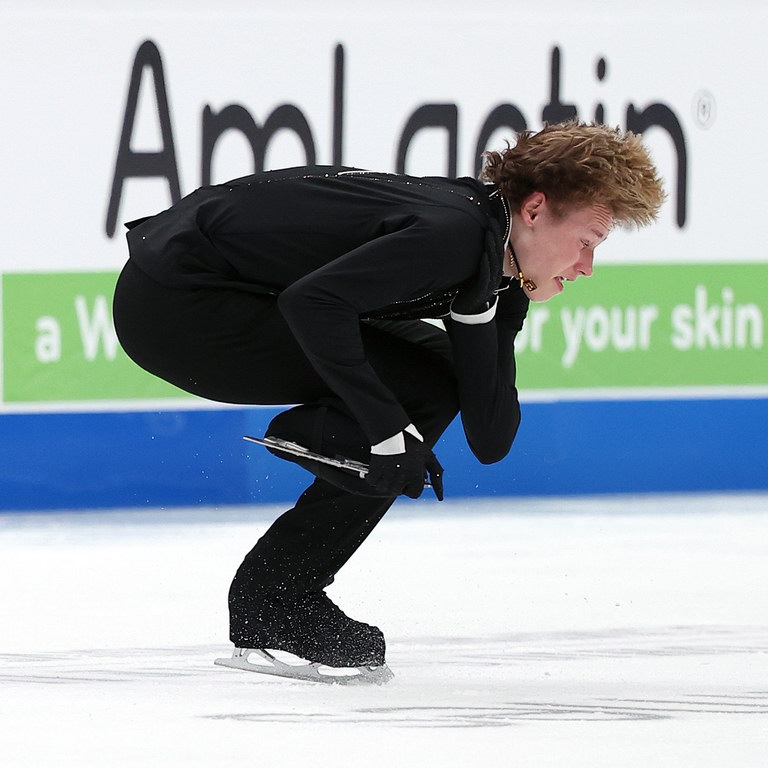
(January 29, 2024) Ilia Malinin, the 2023 World bronze medalist and 2023 U.S.
Champion, scored his second consecutive U.S. title in Columbus
with a firecracker free skate in which he executed a Quad Axel,
the most difficult jump in skating, with command and ease, as
well as several other quads, to rack up the highest total of the
men’s event, a 294.35.
Finishing 30 points ahead of the 16 other top men’s American
contenders, Malinin earned a 185.78 for this dramatic
interpretation to the music from the hit HBO series,
‘Succession.’
Opening up with a lightning-quick quad Axel, Malinin went on to
do a quad Lutz and quad Salchow, and other difficult jumps with
strength, skill and aptitude.
He did, however, miss a quad Lutz and double a quad loop along
with a planned quad toe.
Still, this program, for which Malinin was awarded a 95.10 for
elements and a 91.68 for components, was superior, something
that did not get lost with the Nationwide Arena crowd who
cheered, clapped and whistled for him throughout its entirety.
“Even though it wasn’t what I wished for, it was a fun
experience,” said Malinin, who is the 2022 U.S. silver medalist.
“I enjoyed having the crowd with me every step.”
Malinin, meanwhile, said he is very much looking forward to
competing at the World Championships in Montreal this March.
“I definitely noticed a lot of improvement of just looking at
the audience, having that connection between my own program and
the audience,” said Malinin, who is from Vienna, Virginia. “And
adding those cleaner lines and making everything neater, that’s
the next step going to Worlds.”
Jason Brown, the 2015 U.S. champion and two-time Olympian,
claimed the silver medal with a 264.50 total.
Brown lit up the crowd at the Nationwide Arena with his moving
free skate to ‘The Impossible Dream’ as sung by Josh Groban for
which he was awarded a 175.48, helping him pull up from third in
the short program to second overall.
The Highland Park, Illinois native knocked out two textbook
triple Axels, one in sequence with a double Axel, along with a
soaring triple Lutz-triple toe and triple flip, artful spins and
high-energy footwork, among other elements to rack up an 83.07
for elements.
Meanwhile, he owned the competition in terms of components,
earning a 92.41, the highest score for this element of the free
skate due to his exceptional flow, edges, transitions and
expression, among other things.
For Brown, it was all about having the opportunity to compete
and skate for the audience.
“This was very special,” said Brown. “The crowd was awesome and
energy helped that much more.”
Camden Pulkinen of Scottsdale, Arizona clinched bronze, pulling
up from fifth in the short program due to his stellar free skate
to music from ‘Tosca’ and ‘La Boheme’ by Giacomo Puccini for
which he earned a 174.43 putting his total at 262.33.
Pulkinen, who graduates from Columbia University this year,
wowed the crowd with his stunning arsenal of jumps that included
a quad toe, triple Lutz-triple toe, two triple Axels, a triple
loop, triple Lutz-double Axel sequence and triple flip that
helped him earn the second-highest element score of the event,
an 89.88. (Puliken, meanwhile, earned a 84.55 component score.)
Although he singled a planned triple Salchow in a triple
Axel-half loop sequence, Pulkinen was performed in true star
fashion, something that went over big with the Columbus crowd,
who gave him a standing ovation.
Maxim Naumov of Norwood, Massachusetts, wound up fourth on the
leaderboard with a 260.50 total.
Naumov, the 2022 U.S. junior champion who was second in the
short program of this competition, had an excellent free skate
to ‘Tosca’ by Giacomo Puccini for which he was awarded a 170.78.
In this free skate, he executed a quad Salchow, triple
Axel-double Axel sequence, triple Lutz-triple toe, triple loop,
triple Lutz-half loop-triple Salchow and triple flip to earn an
86.36 for elements. (He was awarded an 85.42 for components.)
Although he fell on a triple Axel and received an edge call on
his triple flip, Naumov’s performance was superior, and, like
that of the other top finishers, was a huge hit with the crowd.
Kam and O’Shea Score First U.S. Pair Title Together
by Liz Leamy
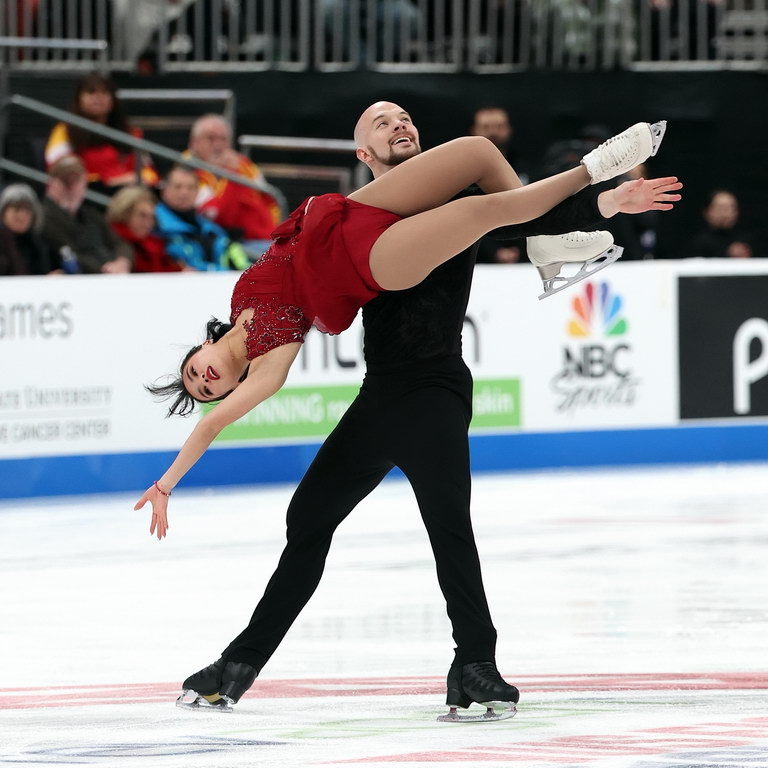
(January 28, 2024)
Ellie Kam & Danny O’Shea, the 2023 U.S. bronze medalists,
scored their first U.S. title together, racking up a 187.76
total after pulling up from second in the short to first overall
with their firecracker freeskate to the ‘Nocturnal Animals’
soundtrack for Abel Korzeniowski.
This poignant program, for which they earned a 123.19, the
second highest marks in this segment of the event, was all about
expression, style and stealth as it featured well-extended
lifts, a big split triple twist and a fluid death spiral, among
other impressive elements.
Skating with attack and speed, Kam and O’Shea, who had placed
second in the short program to Emily Chan and Spencer Howe (who
had withdrawn due to the fact that Howe was experiencing
shoulder issues), resonated of a world-class standard, despite
missing their throw triple loop and throw triple Salchow.
For their program, Kam and O’Shea earned a 62.71 technical score
and 62.48 component score.
“It’s gratitude to be out here again in front of this amazing
crowd,” said O’Shea. “It always feels good to stand on the
podium. As they called our names for the ceremony, we wanted to
soak up the moment-you never know when the next time you get an
experience like this.”
Alisa Efimova & Misha Mitrofanov clinched second in the final
tally after having placed fifth in the short program with a
nearly flawless program to ‘Iron 2021’ by Woodkid for which they
were awarded a 126.43, the highest score for this portion of the
event, for a 186.91 total.
Reeling off such elements as a big split triple twist, high
throw triple loop, nice death spirals and graceful lifts, among
other impressive things with incredible speed, skill and
command, this team was awarded 65.79 for their elements and a
60.64 for their components.
“You never know what’s going to happen and we are grateful to
end up where we are,” said Efimova and Mitrofanov.
Although they two-footed a throw triple Salchow, their skating
standard was of a superior quality indicating they will be a
force for many other teams to contend with on both the domestic
and international fronts in years to come.
Valentina Plazas & Maximilano Fernandez, skating to music from
the ‘Top Gun: Maverick’ soundtrack and ‘Hold My Hand’ by Hans
Zimmer for their free skate, shot up from fourth in the short to
third overall, earning a segment score of 117.85 and 181.03
total.
All about power, strength and aptitude, Plazas and Fernandez did
gorgeous lifts, a big throw triple loop, a soaring split triple
twist and a compelling step sequence among other notable
elements for which they earned solid marks.
“It’s a very humbling experience to be here with a medal,” said
Plazas and Fernandez. “We’ve worked really hard to be here. It
was really great to go out there and fight.”
For their elements, Plazas and Fernandez were awarded a 59.57
and a 58.28 for their components.
Chock and Bates Battle Flu and Their Competition for Fifth U.S. Dance Title
by Liz Leamy
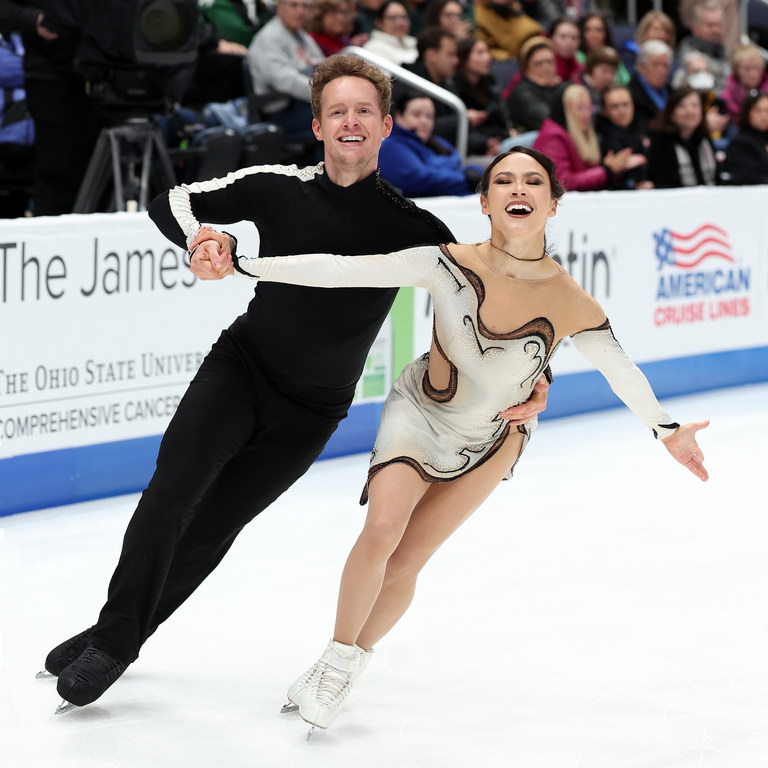
(January 28, 2024)
Madison Chock & Evan Bates, the four-time U.S. champions and
2023 World gold medalists, clinched their fifth American title
at the U.S. Championships this week, scoring a 215.92 total to
put them nearly six points ahead of the 13-entry roster.
Skating their free dance to ‘Time,’ ‘Breathe’ and ‘Eclipse’ by
Pink Floyd, Chock and Bates reeled off intricate lifts, complex
footwork sequences and beautiful spins with ease, skill and
command to earn a 123.75, the second-best scores of this segment
of the competition.
Their lifts, in particular, were exceptional.
Moreover, this program seemed to have a powerful effect upon the
crowd as many in the Nationwide Arena responded to their program
with big cheers and applause.
“I think Evan and I have always had a lot of determination and
willpower,” said Chock, who, along with Bates, had struggled
with the flu all week. “We just tried our best today. If we can
do this, we can do anything.”
Christina Carreira & Anthony Ponomarenko, the 2023 U.S. bronze
medalists, clinched silver with a 210.04, maintaining their
second-place finish after the Rhythm Dance, performing a
fantastic free in which they interpreted the music from the
‘Perfume’ soundtrack and Audiomachine.
Earning the highest marks of the free dance, a 126.85, Carreira
and Ponamarenko’s skating was all about deep edges, quick turns,
smooth steps, fluid twizzles, graceful lifts and wonderful
transitions.
Highlights of their program included their twizzle sequence and
step sequence, which they did with flow, solid edges and
terrific ease.
“We knew what we had to do when we went out on the ice,” said
Carreira.
Ponomarenko agreed.
“We had a lot of time after the Grand Prix to focus and work on
our programs,” he said. “We try to perform everyday like we did
today.”
More than anything, the two expressed the narrative of their
program, which was about love turning into obsession, in
effective and resonating fashion, a storyline that went over big
with Nationwide Arena crowd.
Emily Bratti & Ian Somerville, who were fifth at the 2023 U.S.
Championships, wound up third on the leaderboard with a 196.94
total, earning 118.80 in the free dance.
Wearing dramatic red outfits, Bratti and Sommerville, who skated
to ‘Ne Me Quitta Pas’ by Celine Dion, had a remarkable
performance defined by incredible body lean, deep, solid and
fluid edges, as well as power and expression.
“It was such an incredible experience,” said Emily Bratti. “I
think coming into this competition, we didn’t know how it would
play out. This was definitely a surprise for us.”
Sommerville, like Bratti, was excited about their performance.
“We love our programs this year and we’ve put in so much
effort,” said Sommerville. “We were just able to focus and keep
ourselves locked into each other.”
Glenn Clinches Her First U.S. Title
by Liz Leamy
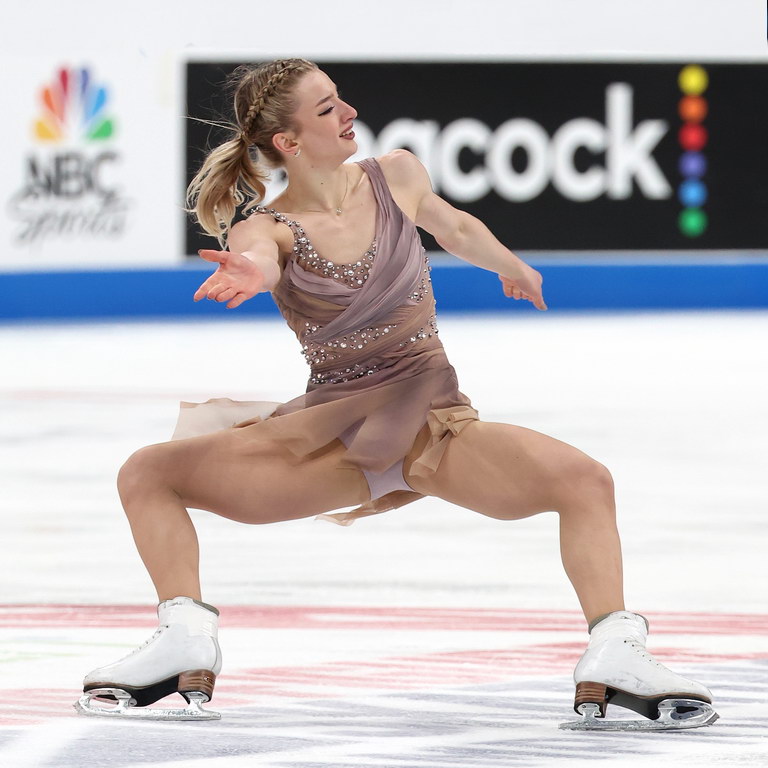
(January 27, 2024) Amber Glenn, the 2021 U.S. silver medalist and 2023 U.S. bronze
medalist, scored her first-ever U.S. Championship title in
valiant style with an action-packed free skate in which she
reeled off a huge triple Axel along with other memorable jumps
and elements to earn the event’s highest total, a 210.46.
Earning the second-highest marks of the free skate, a 135.48,
Glenn, a Plano, Texas native, earned plus-two, plus-three and
plus-four grade of execution marks for the majority of her
elements in her program to ‘Exogenesis: Symphony, Part 3’ by
Muse, racking up a 65.28 technical score and 70.20 component
score.
In the first half of her program, Glenn did a gorgeous triple
Axel, designating her as one of only a few American women to
ever accomplish this feat at a U.S. Championships, along with a
triple flip-triple toe loop, triple loop-triple toe loop, triple
Salchow and triple loop, but in its second half, she singled a
planned triple flip and doubled a triple Lutz, which in turn,
affected her scores a slight bit.
Still, Glenn’s skating was stellar and she flew through her
spins, spirals and other moves and elements with great energy
and aptitude.
For Glenn, this benchmark finish represented a personal win for
her perhaps more than anything.
“It’s absolutely incredible to have this experience,” said
Glenn. “This is such a huge success for me, but I also know I’m
capable of much more.”
Glenn, who is coached by Damon Allen and Tammy Gambill in
Colorado Springs, Colorado, further pontificated on being in
this golden position.
“I think I’m just trying to figure out how to trust myself and
not doubt my capabilities,” said Glenn. “I’m going to keep
working.”
Josephine Lee, the 2022 U.S. junior bronze medalist, scored
second with a 204.13 total due to her flawless free skate to
‘Poeta en el Mar’ by Vincente Amigo in which she executed her
seven jump requirements with attack, command and energy, earning
the highest marks of this segment of the competition, a 138.85.
Lee, who trains with Amy Evidente, Tammy Gambill and Ivan Dinev
in Lakewood, California, wowed the crowd with her speed, skill
and confidence, who gave her a rousing standing ovation when she
finished her performance.
Lee, meanwhile, had the highest technical score of the event, a
74.59, and its third-highest component score, a 64.26.
“It’s such a surreal feeling and I’m just happy I’ve been able
to show everybody what I was capable of,” said Lee, who was
fifth in the short program before pulling up to second overall.
“I just tried to stay present and grounded.”
Isabeau Levito, the 2023 U.S. champion, claimed bronze with a
200.68 total.
Having lead the 18-member contingent in the short program,
Levito had a few falls, causing her to wind up fourth in this
portion of the competition with a 125.30 and wind up third
overall on the leaderboard.
Skating to ‘The White Crow’ by Lisa Batiashvili, Levito executed
a triple flip, triple Lutz-half loop-triple Salchow and two
double Axels but fell on a the landing of a triple Lutz-triple
toe combination, triple loop and triple flip.
Still, Levito’s program was fluid and riveting and her graceful
style of skating earned her solid marks while she was also a big
hit with the Columbus crowd.
“It’s all a learning experience and it was really great to have
the crowd cheering me on,” said Levito, who trains with Yulia
Kuznetsova in Mount Laurel, New Jersey. “It was really
heartwarming and I felt really loved. I think this is one of the
best parts of the sport.”
Sarah Everhardt, who was 13th at the 2023 U.S. Championships in
the junior event, finished fourth with a 193.37 total due to her
third-place standing in the free skate in which she earned a
score of 130.16.
Everhardt, who trains in Reston, Virginia with Tatyana Malinina
and Roman Skorniakov, Ilia Malinin’s parents who are both former
Olympic singles competitors, pulled up from sixth in the free
skate with clean and memorable program to ‘Four Seasons/Winter’
by Antonio Vivaldi for which she also earned a huge standing
ovation.
Everhardt reeled off a huge double Axel-triple toe loop that
covered almost the entire rink width, triple flip, triple Lutz,
triple loop-double Axel sequence, triple loop, triple
Lutz-double toe-double loop and triple Salchow with power,
beauty and ease and in turn, was awarded a majority of plus-two
and plus-three grade of execution marks from the judging panel.
For Everhardt, the biggest thing was the fact that she skated
two clean programs at this event while also having such
fantastic support from the crowd.
“It’s really cool that I could put two clean programs together,”
said Everhardt. “It was also really cool to have everyone
supporting me and kind of skating with me.”
Malinin Takes SP with 19 point Lead
by Liz Leamy
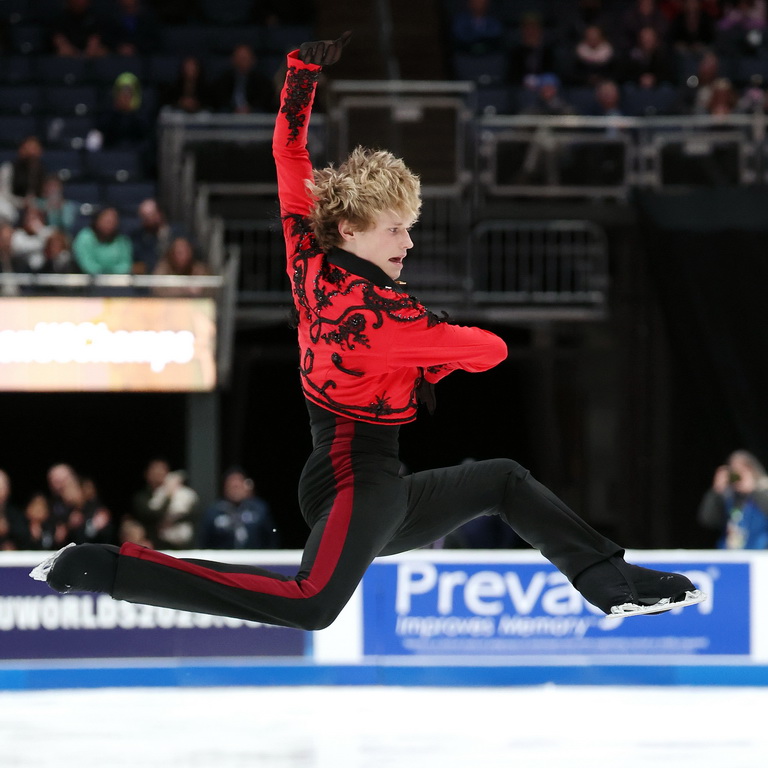
(January 27, 2024) Ilia Malinin, the 2023 U.S. titlist, 2023
World bronze medalist and 2022/2023 ISU Grand Prix Final
champion, easily catapulted to the top of the men’s leaderboard
at the U.S. Championships with a stellar short program that
featured a quad toe, triple Axel and quad Lutz-triple toe
combination to earn a 108.57, numbers that put him ahead of the
17-member field by a staggering lead of nearly 19 points.
Right from outset, Malinin had full command of the crowd at the
Nationwide Arena as he flew around the ice with great strength,
command, skill and presence, generating applause, cheers and
whistles from the crowd upon executing all of his elements,
especially the quads, to the dramatic piece ‘Malaguena’ by Roni
Benise.
For his performance, Malinin was
awarded a 61.99 for his
technical scores and a program
component score of 46.58.
According to Malinin, this was a
memorable outing in all regards.
“I felt a lot of energy from the
crowd and was able to use that
energy to push myself and
entertain and skate for the
audience,” said Malinin, who
lives in Reston, Virginia. “To
be here at the U.S.
Championships means a lot.”
Maxim Naumov of Norwood,
Massachusetts who had placed
fourth at the 2023 U.S.
Championships, clinched the
second-highest marks of this
competition, an 89.72, for his
crisp, exciting and stellar
program to Joji’s ‘Glimpse of
Us.’
Wearing black pants and maroon
top, Naumov commanded the ice
with the confidence and stealth
of a top contender, reeling off
a huge and solid quad Salchow,
nice triple Axel and soaring
triple Lutz-triple toe in expert
fashion.
Naumov’s skating, which was
defined by incredibly clean and
fluid lines that correlated
ideally with the music, was,
like Malinin also a big hit with
the crowd.
For his performance, Naumov was
awarded a 48.98 for his elements
and a 40.74 for his components.
“I definitely feel happy with
how I did, for sure but am now
staying focused on Sunday,” said
Naumov in regard to the final
free skate portion of the
competition that will be held on
Sunday, January 28th. “The
National Championships are what
your whole season leads up to.”
Naumov, meanwhile, spoke about
on his excitement in regard to
having the opportunity to
compete at Nationals.
“I always love all the energy,
the atmosphere, the vibe and the
people in the audience as well
as being with my friends and
family,” said Naumov. “I just
love the competition.”
Jason Brown, the 2015 U.S.
champion, claimed the
third-highest marks of this
event for his riveting program
to ‘Adios’ by Joseph Clementine,
earning an 89.02.
Another huge crowd favorite,
Brown earned big applause for
his performance, which featured
a soaring triple flip, triple
Lutz-triple toe, gorgeous spins,
terrific edges and innovative
connecting moves and footwork.
Although he missed the landing
of his triple Axel, Brown
delivered the goods to rack up a
46.17 component score and 43.85
for his technical elements.
“This feels like a homecoming
and I felt great out there,”
said Brown, who, in addition to
winning the 2015 U.S. title, has
scored medals at Nationals in
the Championship division six
times over the years, earning
three silver and three bronze
medals in total to date. “I love
the fight and am looking forward
to the free.”
Brown also spoke about the
ever-evolving standard of the
sport.
“The level of skating just
continues to be elevated year
after year. You see that in Ilia
and you saw that in Nathan
(Chen, the 2022 Olympic
champion, three-time World
victor and six-time U.S.
titlist).” said Brown, who hails
from Highland Park, Illinois.
“It’s awesome for the sport and
the country.”
Brown also gave big props to
vital role of the audience and
to all the people who help
support skating in this vital
capacity.
“We also owe a lot of the sport
to the audience,” said Brown.
“This sport is so much about
engagement and the whole
participative element is what
makes it so unique and
engaging.”
Levito Locks in Lead in Dramatic U.S. Women’s Short Program Showdown
by Liz Leamy
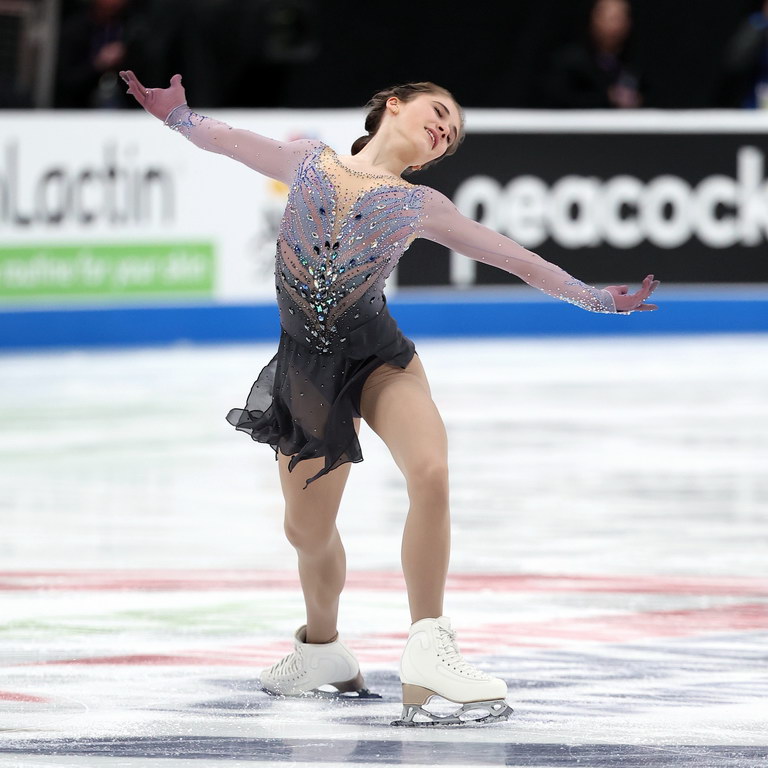
Isabeau Levito, the reigning U.S. champion and 2022-2023
International Skating Union Grand Prix Final silver medalist who
hails from Mount Holly, New Jersey, clinched first place in the
women’s short program with a 75.38, edging out Amber Glenn, the
2021 U.S. silver medalist, by a fourth of a point.
Donned in a stunning black and white ombre dress, Levito earned
the event’s highest points due to the incredible quality of her
program to ‘Nella Fantasia’ by Jackie Evancho in which she
executed an electric triple Lutz-triple toe combination, easy
triple flip and gorgeous double Axel as well as artful spins and
graceful footwork.
Skating with confidence, strength and power, Levito scored the
highest element score among the 18 talented contenders who
qualified for this competition, a 39.96, earning a majority of
plus-three and plus-four grade of execution marks from the
judging panel for nearly all of her seven required moves.
For Levito, the primary goal was to just do her best.
“I’m really happy with how I skated today and I’m excited about
tomorrow,” said Levito, who also had the highest component score
of the competition, a 35.42. “I’m excited especially with the
new program.”
Prior to this event, Levito, who trains with Yulia Kuznetsova in
Mount Laurel, New Jersey, had been skating to a different piece
of music this season, ‘Yearning’ by Raul Ferrando, citing the
change was due to the fact that she wanted to try something
different for this competition.
Amber Glenn earned the second highest marks of this showdown, a
74.98, for her super-charged program to ‘Heads Will Roll’ by
Elephant Music and the Yeah Yeah Yeahs.
Wearing a black unitard lined with diamond embellishments,
Glenn, like Levito, generated big applause from the crowd along
with big scores from the panel of officials for her elements and
artistry which included a soaring triple flip-triple toe,
powerful triple loop and nice double Axel as well as other
memorable things.
In this competition, Glenn racked up the event’s second-highest
element total, a 39.68, as well as the second-best component
score, a 35.30.
“It was an overall enjoyable experience and I’m happy with what
I did today. This is such an important event for me,” said
Glenn. “I just had a really good time.”
For Glenn, her love for the sport is always a top priority.
“I’m at the point in my career where I’m doing it because I
enjoy it,” said Glenn, who is from Plano, Texas and trains with
Damon Allen and Tammy Gambill in Colorado Springs. “I just enjoy
figure skating and what I do and I feel it is what helps me in a
performance.”
Clare Seo, the 2022 U.S. junior champion who was seventh at the
2023 U.S. Championships, scored the third-highest marks of the
competition, a 67.41, for her action-packed program to ‘Simple
Gift’ by Yo-Yo Ma and Alison Krause and ‘Appalachian Spring’ by
the New York Philharmonic.
Wearing a maroon ombre dress, Seo reeled off a triple
Lutz-triple toe, triple loop and double Axel with fantastic
power, explosiveness and command as well as beautifully
positioned, high-speed spins, among other things that resonated
in a big way with the crowd as well as officials.
For this program, Seo, who trains in Colorado Springs with Tammy
Gambill, earned a total element score of 37.11 and component
score of 30.30.
Chock and Bates Take Commanding Lead in the U.S. Championships’
Rhythm Dance Competition
by Liz Leamy
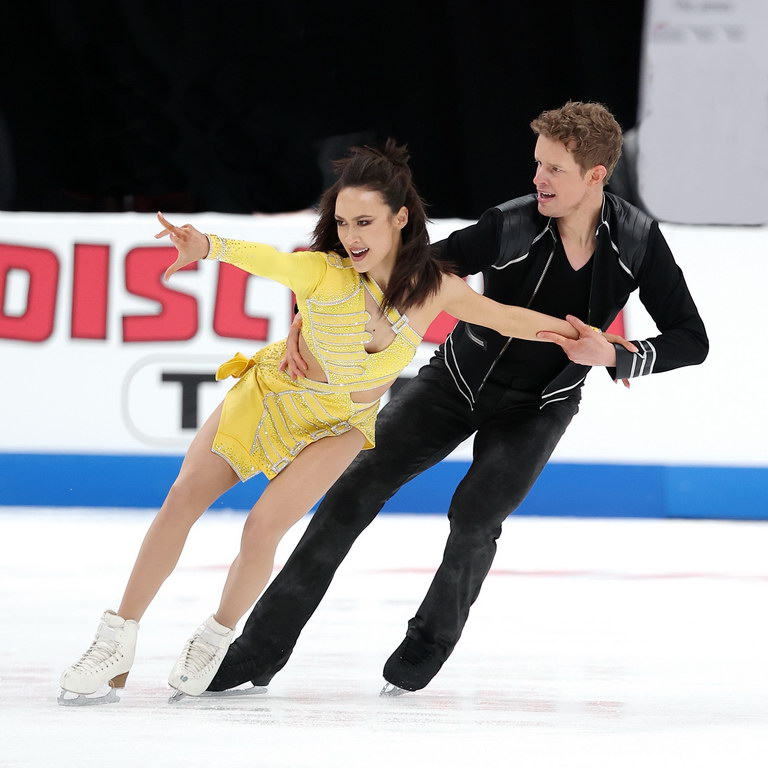
(January 25, 2024) Madison Chock & Evan Bates, the reigning
World champions, three-time World medalists and four-time U.S.
titlists, commanded the Rhythm Dance competition in standard
golden style with their electric program to a Queen medley,
claiming the top slot on the leaderboard with a 92.17, taking a
nearly nine-point lead among the 13 total teams skating in this
event.
In signature glamorous fashion, Chock donned a stunning yellow
dress with diamond accents that popped alongside Bates’ black
costume to present an extraordinary program defined by gorgeous
edges, lines, flow and artistry.
In characteristic style, Chock & Bates also executed all of
their elements with tremendous command, expertise and aptitude.
Their arsenal included snapfire-style twizzles, a dramatic and
fluid lift, theatrical midline sequence, high-energy pattern
dance-type sequence and super-charged choreographic rhythm
sequence for which they earned big grade of execution marks from
the judging panel.
For Chock & Bates, however, their victory was having another
opportunity to compete at a U.S. Championships.
“The U.S. Championships are such a special event and have such a
unique energy,” said Chock. “To feel the electricity of the
audience brings such joy and the more we continue to grow in
this sport, the more we realize how special it is.”
For Chock & Bates, their primary purpose is to continue to grow
and evolve in regard to their skating.
“It’s a persistence to drive and improve,” said Chock. “We love
learning, exploring new avenues of creativity and to push
ourselves. It’s been a wonderful journey.”
Christina Carreira & Anthony Ponomarenko clinched second with an
83.19 for their dramatic and high-tech performance to a Stevie
Nicks medley.
Steady, strong and fluid, Carreira & Ponomarkenko’s performance
was all about outstanding edges, body lean, fluidity and power
as they racked up high scores for their elements that included a
pattern dance type sequence, twizzles, midline, curve lift and
choreographic sequence.
“We’re really happy with the skate we put out today,” said
Carreira.
Ponomarenko agreed, further pontificating on his gratitude about
competing at the U.S. Championships.
“This event is the best top to bottom and to be part of it is
very special,” said Ponomarenko.
Caroline Green & Michael Parsons claimed third in this event with
their super-adrenalized program to ‘Still Loving You’ and ‘Rock
You Like a Hurricane’ by the famed German rock band, the
Scorpions, for which they earned an 80.91.
Wearing heavy metal-inspired costumes, Green & Parsons earned
excellent grade of execution marks and component scores for
their elements which included a sharp midline, power-charged
twizzles and an edgy, quick straight-line lift, among other
notable things.
Excited about their performance, Green & Parsons also spoke
about the thrill of competing at the U.S. Championships.
“Nationals always has such a unique energy and it was great to
get out there in front of the home crowd,” said Green.
Parsons also spoke about how much the two have been working in
preparation for this event.
“This competition is one we’ve approached with more preparation
than ever and I think that shows,” said Parsons.
Chan and Howe Edge Out First in U.S. Pairs Short Program
Competition
by Liz Leamy
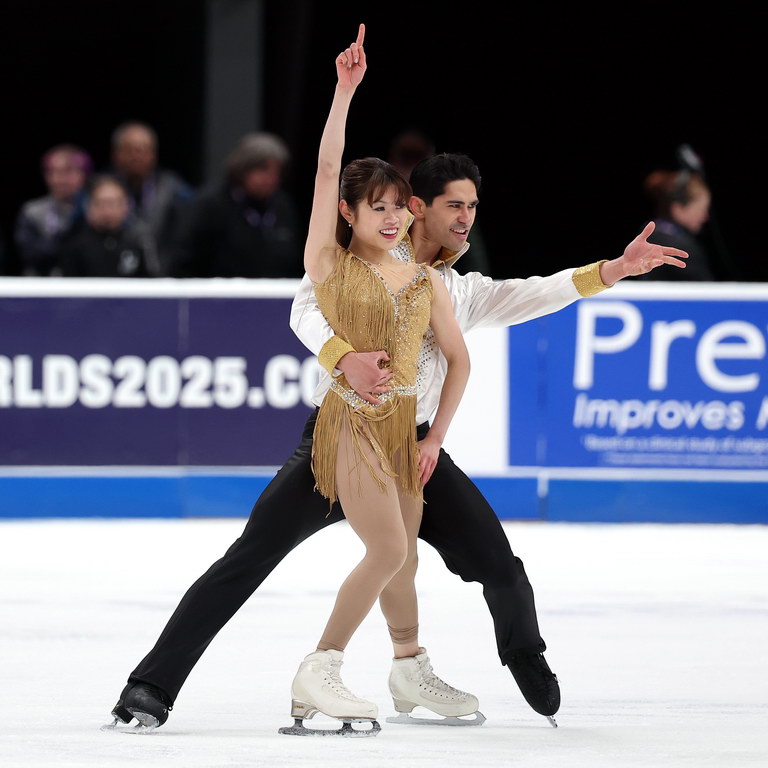
(January 25) The Championship Pairs short program competition at
the 2024 Prevagen U.S. Championships in Columbus was said to be
anyone’s game going in with all of the 12-team entries being
outstanding, but, in the final tally, Emily Chan and Spencer
Howe skated away with the highest marks of the event, a 65.86,
edging out a narrow lead of nearly one and a half point over of
the rest of the field.
Skating to a catching techno version of Elvis Presley’s
‘Craw-Fever,’ Chan & Howe racked up the highest marks of the
event for their electric skating style and top-notch elements,
covering the ice with tremendous speed, flow and strength, among
other critical things.
Along with a big opening split triple twist, the Skating Club of
Boston duo also executed rock-solid triple toe loops, a dramatic
death spiral, nicely synched combination spins and a fluid and
beautifully extended lift right that was in tandem with the
music’s inflections.
Although the two experienced a fall on their throw triple loop,
their program was outstanding, as they rightfully earned the
biggest program components of the event, a 32.31.
Their performance was also impressive considering it had been
nearly a year since they had competed due to the fact that Howe
was recovering from a shoulder injury.
“For us to be here and sitting where we’re sitting is a huge
blessing,” said Howe. “It felt really great to be out there.”
For Chan & Howe, it is all about embracing opportunities
presented by facing challenges that they face in regard to their
training and skating.
“We both knew we would be out there together,” said Chan. “It’s
nice to be here and feel the energy of the crowd. It’s a
reminder of what it’s like to be in a competition environment.”
Howe agreed.
“We’ve learned to embrace adrenaline and embrace the crowd,”
said Howe. “We’ve done a lot of competition simulations leading
up to here, but nothing beats competition.”
Ellie Kam & Danny O’Shea scored the second-highest marks of this
portion of this event, a 64.57 for their moving and powerful
interpretation to the musical score from the classic Hollywood
movie, ‘East of Eden.’
Donned in green and black costumes, Kam and O’Shea earned the
second highest component and element scores of this portion of
the competition, a 34.59 and 30.98, respectively.
Their program featured many memorable moments, including
excellent side-by-side triple Salchows, a stunning
helicopter-like lift, beautifully positioned synchronized spins
and a stunning death spiral done in perfect concert with the
crescendos of the music.
Although they had a fall on their throw triple loop, their
program was memorable in all respects and resonated with the
crowd who gave them roaring applause at its conclusion.
For Kam & O’Shea, the experience was a good one in all regards.
“We’re happy to be here performing in front of the amazing crowd
here in Columbus,” said O’Shea. “We’ve been training really hard
and feel confident, especially going into the second half of the
season.”
Katie McBeath & Daniil Parkman clinched third with a 64.21,
earning the highest total element score, a 35.86, for their
clean and high-charged program to ‘Requiem for a Dream’ by Clint
Mansell.
This dynamic duo knocked out a big split triple twist, excellent
triple toe loops, a high throw triple Lutz, adrenalized spins
with terrific lines and positions, a nice step sequence and
soaring lift with notable ease, command and strength.
“It’s been so fun and I feel like I’m home,” said McBeath, who
grew up in Cleveland, Ohio, just several hours north of
Columbus. “So far I’m loving it here and I have family and
friends who are going to come to watch.”
McBeath elaborated on the joy of having the opportunity to
compete with such wonderful teams and skaters at this
competition.
“We’re going to keep pushing each other. It makes for great
energy and a great competition,” said McBeath.
[Note: Following the event segment Kam and Howe withdrew from
the competition due to the residual effect of Howe's
longstanding shoulder injury.]
Malinin Favored to Win Second U.S. Title at 2024 U.S.
Championships in Columbus, OH
by Liz Leamy
Ilia Malinin, the American jumping
sensation who is the reigning U.S. Men’s champion, 2023 World
bronze medalist and 2023/2024 International Skating Union Grand
Prix Final titlist, is fired up to put out two top-notch
programs at the 2024 U.S. Championships in Columbus, Ohio this
week with a goal of clinching a second consecutive U.S. title.
“How well I perform at Nationals will
definitely give me that confidence boost, that adrenaline and
motivation I need to get to focus onto maximize my achievements
at Worlds,” said Malinin, who is the 2022 U.S. silver medalist
and 2022 World Junior champion. “I think Nationals will give me
a really good base to see what things I can work on and other
things I’ve really started to improve on in terms of how they
work at the beginning of the season and now.”
This incredibly driven and talented 19
year-old, who lives in Vienna, Virginia, close to the Reston,
Virginia facility where he spends much of his time training with
his parents, Roman Skorniakov and Tatiana Malinina, who were
both Uzbekistani Olympic singles competitors, has emerged as a
major global sports figure over the past few years due to the
fact that he is the only skater to have ever successfully
executed a quad Axel at a national or international competition.
For Malinin however, it’s about staying
focused on the present as he goes into each day with the
intention of building upon his skating artistically as well as
technically.
“Every year I’m always trying to evolve in
terms of skating mentally,” said Malinin, who graduated from
George C. Marshall High School in Falls Church, Virginia last
year and is now taking online classes at George Mason
University. “This season it was about the artistry and
cleanliness of my programs, which was really the main focus.
Last year, it was really about getting the quads and to have
that solid base.”
Malinin, who also trains with Rafael
Arutyunyan at Great Park Ice and Fivepoint Arena in Irvine,
California, certainly knows how to get the job done, especially
in noting all of his extraordinary accomplishments over the past
several years.
Back in 2019, when Malinin was the U.S.
Novice bronze medalist, there was a definitely a lot of buzz
about him being one of the sport’s upcoming stars.
Then, in 2020, Malinin did respectfully,
having racked up several top 10 finishes at ISU Junior Grand
Prix events that season as well as placed 16th at the
2020 World Junior Championships.
After that season, this laser-focused
athlete then went into serious warrior mode and began to train
more intensively than ever, a pivotal time from which he then
went onto emerge as one of the top skaters in the world.
By 2022, Malinin was able to execute nearly
all the quad jumps in stunning and consistent fashion, element
that helped catapulted him to the pinnacle of men’s single
skating both domestically and internationally at the
Championship level.
That year, he victoriously clinched silver
at the 2022 U.S. Championships in January, placing right behind
Nathan Chen, the 2022 Olympic champion, three-time World titlist
and six-time U.S. gold medalist and then gold at the 2022 World
Junior Championships in March.
After this game-changing season, Malinin
continued to further elevate himself as a premier world
contender while also going on to make sports history upon
executing a clean and solid quad Axel at the 2022 CS Classic
that September and then again at the 2022 ISU Skate America
Championships in October where he finished first.
Since that time, Malinin has only gone on
to further evolve as a leader of the sport in terms of both his
technique and artistry.
At the same time, he has also been learning
to embrace the whole all-important concept of handling pressure
being a top U.S. and world contender.
“At first it was new and something that I
wasn’t used to. I think over the past couple of years, I’ve
really gotten used to it and familiar with it and I’ve learned
how to really take it in and use it to my advantage,” said
Malinin. “I try to say to myself ‘try to do what you’ve done in
practice and to really focus on that muscle memory’ and to just
enjoy the performance and enjoy the crowd as much as possible.”
Malinin, meanwhile, also talked about how
grateful for all the hard work and dedication of his parents in
regard to his skating over the years.
“I look up to both my parents. They were
really successful in this sport and they were at a high level,
so they know how to go through this whole process and it just
means a lot that they’re always there to support me and just
help me,” said Malinin. “The fact that they’re also my parents
means they also know what I’m feeling and they can really help
me mentally and physically. They’ve put in so many hours,
including just driving me to the rink. I’m grateful for them.”
In considering all the dedication, work,
time and heart that Malinin, his parents, Arutyunyan and the
rest of his team have been putting in to his skating, this
certainly ought to be another memorable experience in regard to
seeing him compete at the U.S. Championships in Columbus
this week, that is for sure.
Isabeau Levito Looking to Clinch Second U.S. Title in
Columbus
by Liz Leamy
Isabeau Levito is as geared up as ever to make a golden mark
at the U.S. Championships in Colombus, Ohio with the hopes of
scoring her second consecutive U.S. title.
Levito, the 16 year-old 2023 U.S. champion who is the
2022-2023 International Skating Union Championship Grand Prix
Final silver medalist and 2022 World Junior titlist, has been
working as hard as ever to indeed achieve that goal at this
celebrated annual sports event that will be held at the
Nationwide Arena from January 22nd to 28th.
“I expect myself to do programs where I just go into every
jump and let loose and go for things,” said Levito, who trains
with a team of coaches headed by Yulia Kuznetsova at the Igloo
Ice Rink in Mount Laurel, New Jersey, which is located just 15
minutes away from her home in Mount Holly, New Jersey. “I just
hope to give a beautiful performance not only that can be
deserving of a gold medal, but also beautiful to watch and
entertaining.”
Certainly, this athlete seems to know exactly how to do just
that, especially in looking at her astonishing competitive
record in recent years.
Two years ago at the 2022 U.S. Championships in Nashville,
Levito, who was then 14 and competing as a first-time-ever
senior, racked up an impressive fourth-place finish, as well as
national and worldwide public acclaim for her incredible style
of skating which revolves around terrific grace, beauty and
strength. (At this event, Levito’s signature ‘Swan’ short
program was, in fact, so memorable that it has since had more
than 8.5 million views on the YouTube media platform since it
was first broadcast by NBC Television in January 2022.)
Levito, who also had placed fourth at the 2023 World
Championships and first at the 2021 Championships in the junior
division, has always been all about achieving a gold standard in
regard to skating.
Growing up in southern New Jersey, Levito had taken to
skating when she first started taking group lessons at a rink
near her home.
Around that time, Levito had started working with Kuznetsova
and from there, began her stunning ascent as an emerging U.S.
skating star, having since gone on to rack up dozens of
first-place finishes at competitions throughout the New York
metropolitan area, along the East Coast and around the entire
U.S. continent.
By the time she was competing as a Juvenile, Intermediate and
Novice contender, Levito had become known as a dominant presence
in the sport, having won or reached podium status at virtually
every major competition held through to the National level.
Known for her exquisite technique and artistry, Levito
continued this meteoric climb, having gone on to clinch the U.S.
junior title in 2021 at age 13, place fourth at the 2022 U.S.
Championships at age 14 and then claim the U.S. title at the
2023 U.S. Championships in San Jose at age 15.
For Levito, however, it’s about having the opportunity to
compete, especially when at a major event such as the U.S.
Championships.
“I feel excited for Nationals. I always love Nationals,” said
Levito, who also enjoys reading as well as playing the piano.
“I’m really excited to do my best and see how it all goes.”
Levito, meanwhile, said she is also looking forward to
spending time touring the city of Colombus, especially
considering this will be the first time she will ever be
visiting the state of Ohio.
“I’m really excited to go and explore a little because I’ve
never been in Ohio,” said Levito. “I’m really glad Nationals is
being hosted there so I can visit another state I haven’t
visited before.”
At this event, Levito, who was also fifth at the 2023-2024
ISU Grand Prix Final last December, plans to skate to Raul
Fernando’s ‘Yearning’ for the short program and to music from
The White Crow film soundtrack by Ilan Eshkeri as performed by
Lisa Batiashvili for the free skate.
Asked what she thinks about the entire Championship roster of
women skaters, Levito said she is excited to see everyone in
Columbus, many of whom she considers to be good
friends.
“It’ll be really fun to compete,” said Levito. “I think we’re
all really strong skaters and I’m excited to see them all
because they’re really wonderful people.”
| 
